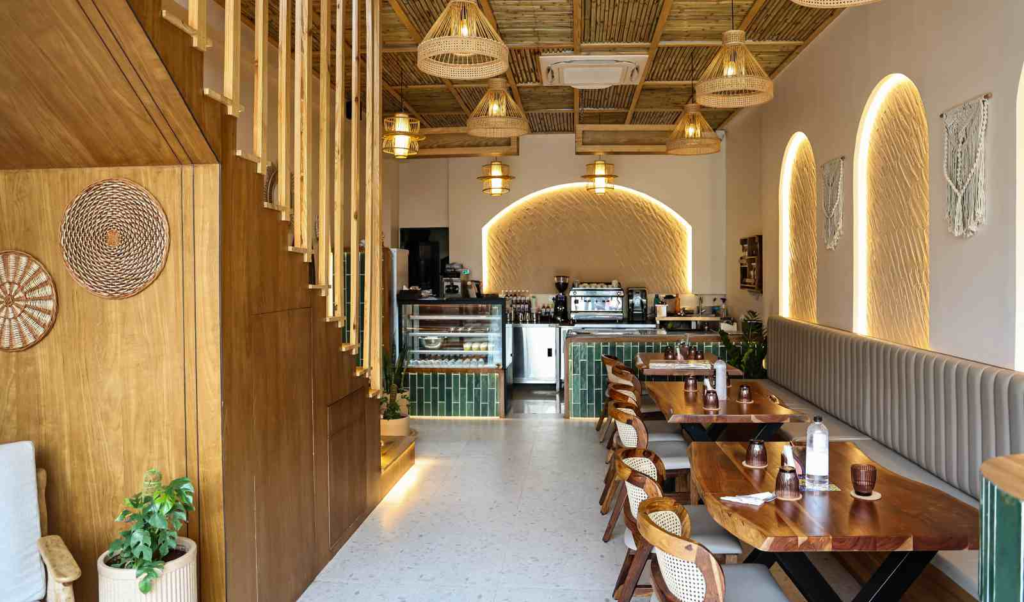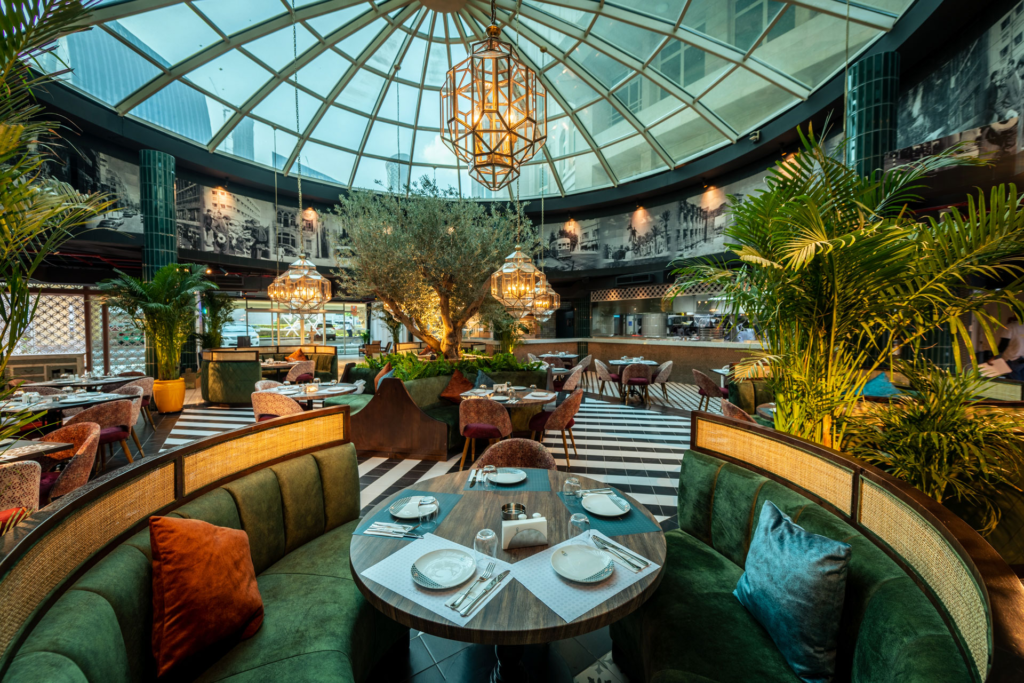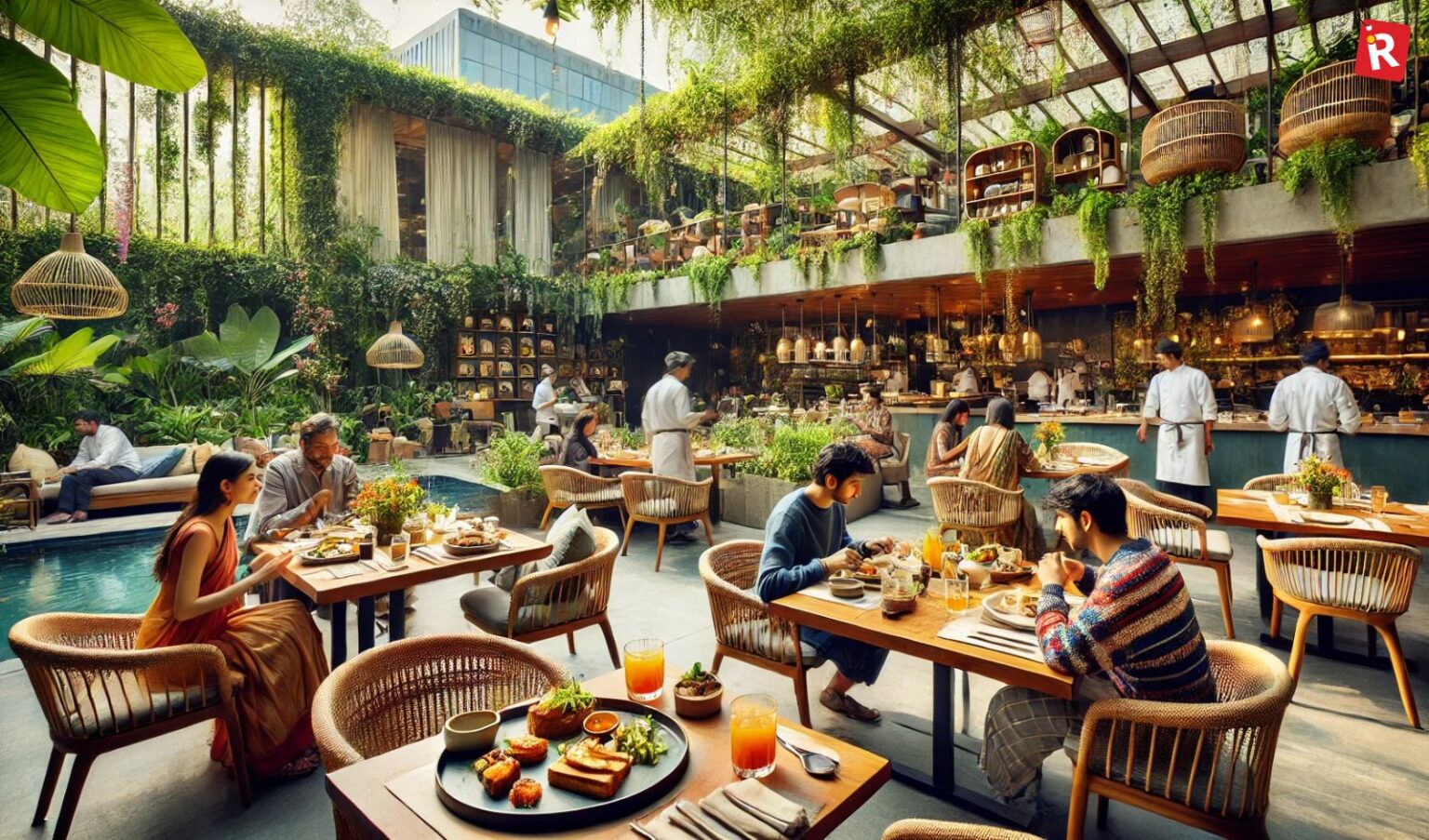Smart restaurant concepts are quickly transforming the Gulf dining scene. As technology advances and consumer expectations rise, restaurants across the Gulf Cooperation Council (GCC) countries—such as the UAE, Saudi Arabia, Qatar, and Kuwait—are embracing intelligent solutions to stay competitive. These innovations are improving everything from customer service to kitchen operations, helping restaurants operate more efficiently while providing a memorable dining experience.
By 2027, the Gulf region is expected to become a global leader in smart dining. In this article, we explore the top smart restaurant concepts that are revolutionizing the Gulf dining scene.

1. AI-Powered Ordering and Personalization
One of the most exciting smart restaurant concepts is the use of artificial intelligence to personalize customer experiences. AI-driven systems can analyze previous orders, preferences, and dietary restrictions to suggest tailored menu items. In countries like the UAE and Saudi Arabia, leading restaurant chains are already testing AI kiosks and mobile apps that remember what customers like.
By 2027, AI personalization will become a standard across many Gulf restaurants, helping businesses increase customer loyalty while enhancing the overall experience.
2. Contactless Dining and QR Code Menus
The pandemic accelerated the use of contactless technology, and it remains a top trend. Contactless dining, including QR code-based menus and digital payment systems, allows customers to order and pay from their smartphones. This not only improves hygiene but also speeds up table turnover.
Restaurants in Dubai and Doha are integrating smart tablets and mobile ordering apps to offer a more seamless experience. By 2027, this smart restaurant concept will likely replace traditional menus entirely in many upscale and fast-casual venues.
3. Smart Kitchens and IoT Integration
Smart kitchens are another major development changing the Gulf dining scene. These kitchens use the Internet of Things (IoT) to monitor appliances, track inventory, and maintain food safety standards. Sensors and connected devices can notify chefs when ingredients are running low or if a refrigerator is malfunctioning.
In Riyadh, several new restaurants are testing smart kitchen technologies that increase productivity and reduce waste. By 2027, most high-performing Gulf restaurants will likely depend on IoT to ensure smooth and cost-effective operations.
4. Robot Waitstaff and Kitchen Assistants
The idea of robot servers might sound futuristic, but they are already being used in select Gulf restaurants. Robot waitstaff can deliver food, greet customers, and even interact using programmed dialogues. They can help reduce staff shortages and improve efficiency during peak hours.
Restaurants in cities like Dubai and Kuwait City are using robotic kitchen assistants to prepare simple meals and maintain consistency. By 2027, smart restaurant concepts involving robotics are expected to grow, especially in tech-savvy and high-footfall areas.
5. Voice-Activated Ordering Systems
Smart restaurant concepts now include voice-based technology. Voice-activated kiosks and mobile apps are making it easier for customers to place orders, especially those who may not be comfortable using screens. In multilingual environments like the Gulf, voice systems that support English, Arabic, and other languages can improve accessibility.
This concept is gaining popularity in airport lounges, luxury hotels, and fast-food outlets. By 2027, it will likely be common in mid-to-high-end Gulf restaurants.
6. Eco-Friendly and Energy-Saving Smart Solutions
Sustainability is becoming a priority for smart restaurant concepts in the Gulf. Restaurants are adopting smart lighting, climate control, and waste-reducing technologies to lower their environmental impact. Smart bins can separate organic waste, and digital systems help optimize energy use in kitchens.
The Gulf’s rising focus on green dining is evident in cities like Abu Dhabi and Muscat, where restaurants are encouraged to meet sustainability goals. By 2027, eco-friendly smart solutions will be a key requirement in many Gulf restaurant regulations.
7. Virtual Reality (VR) Dining Experiences
The most innovative smart restaurant concept gaining attention is the use of virtual reality. Some high-end restaurants in Dubai and Doha offer immersive dining experiences through VR headsets. These allow diners to enjoy their meals while being virtually transported to scenic locations or storytelling environments.
This trend adds value to luxury dining and is perfect for attracting tourists. By 2027, virtual reality dining will be a niche but growing sector of the Gulf dining industry, especially in fine dining and experiential concepts.
What’s Driving the Smart Restaurant Trend in the Gulf?

Several factors are accelerating the rise of smart restaurant concepts in the Gulf:
- Tech-Savvy Population: The region has a young and digital-first population eager to adopt new technologies.
- Tourism Growth: Gulf countries are investing heavily in tourism, and smart dining enhances visitor experiences.
- Labor Challenges: Automation helps reduce reliance on labor in a region with increasing labor cost concerns.
- Sustainability Goals: Countries like the UAE have set strong environmental goals, encouraging restaurants to become energy-efficient.
Challenges and Considerations
While smart restaurant concepts are promising, there are challenges. Initial setup costs are high, and not all restaurants can afford advanced technology. Staff need training, and customer data privacy must be protected. Language and accessibility also play a role, especially in diverse cities like Dubai and Doha.
Still, these challenges are being addressed through government support, innovation hubs, and private investment in food-tech startups.
Conclusion
Smart restaurant concepts are no longer a distant dream. They are actively reshaping how people dine in the Gulf, offering a mix of convenience, innovation, and sustainability. As we look ahead to 2027, restaurants that embrace smart technologies will lead the market and attract a growing base of tech-conscious consumers.
Whether it’s AI-based ordering, robot servers, or immersive VR dining, the Gulf region is setting a new global standard for the future of smart dining.
Also Read – Gulf Restaurant:Experts Warn of Hidden Health Hazards in Kitchens (2025)



